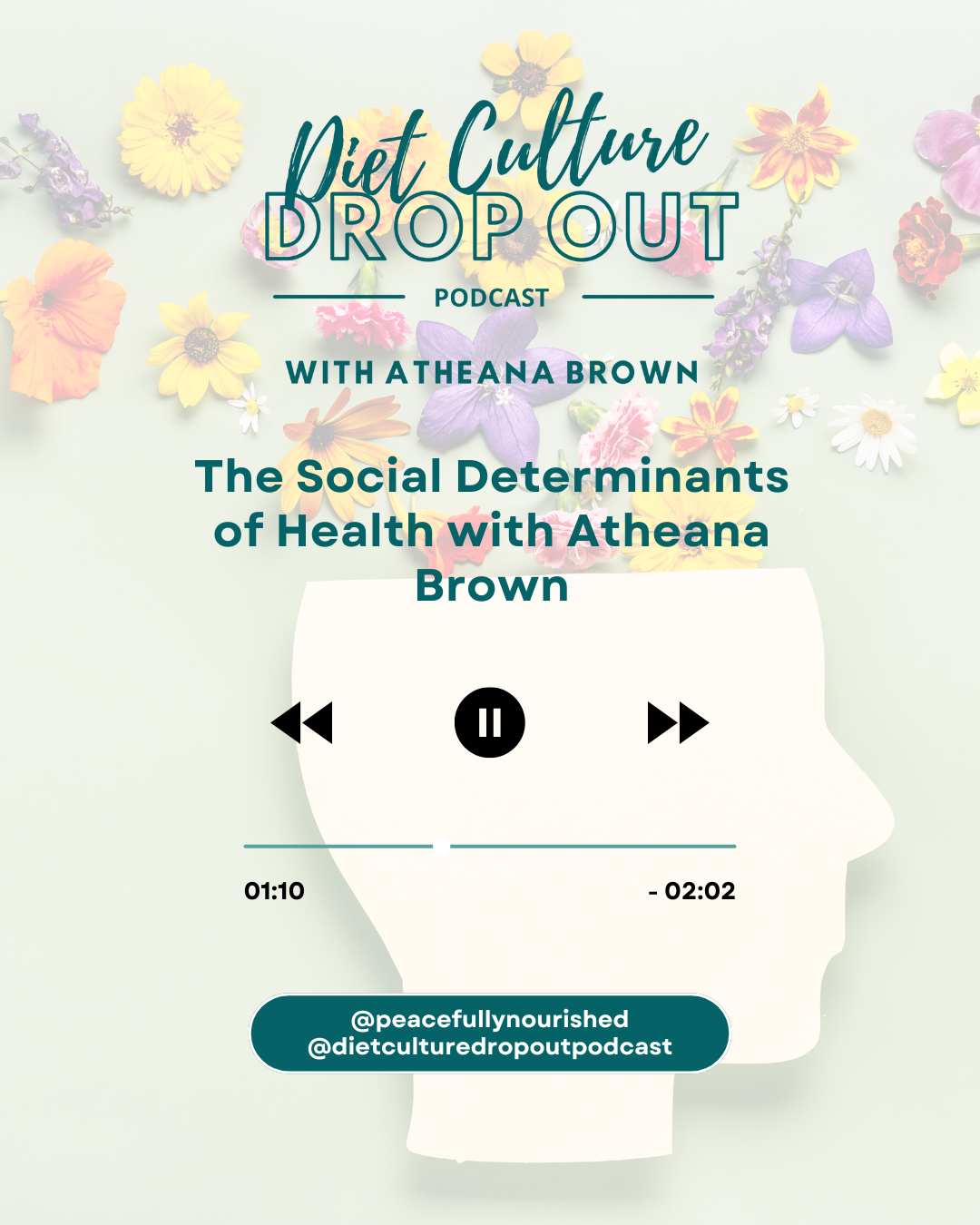The Intersection of Society and Wellness. Latest episode on Diet Culture Dropout lands today.
Listen to the full episode here

Today, we’re delving into an essential yet often overlooked topic: the social determinants of health. Let’s begin with a thought-provoking quote that I recently shared on Instagram:
*”We cannot possibly know anything about people’s lives, movement practices, stress levels, mental health, their intake, their social status, their genetics, their coping skills, their health history, or social connection, etc. when we just look and judge a body.”*
Countless times, people enter a room and are quickly judged based on their appearance, without any questions posed about the myriad factors impacting their health and wellbeing. This issue isn’t limited to everyday interactions but is also prevalent in healthcare settings, where assumptions are made and weight loss is often suggested without a comprehensive inquiry into the person’s life and health history.
What are Social Determinants of Health?
Understanding the social determinants of health is crucial when assessing an individual’s health. These determinants encompass various factors that either elevate someone along the privilege health spectrum or add layers of challenges, eroding their health. The primary areas of concern include:
1. Individual Behavior (36%)
2. Physical Environment (7%)
3. Medical Care (11%)
4. Genetics and Biology (22%)
5. Social Circumstances (24%)
Individual Behavior
Individual behaviors are under our control to a significant extent and account for 36% of our health:
– Risk-related behaviors: How we handle firearms, sexual activity, and motor vehicle behavior.
– Physical activity and dietary patterns: Our choices in terms of exercise, diet, sleep, and substance use (alcohol, tobacco, etc.).
– Psychological assets: Life satisfaction, self-efficacy, optimism levels, and how we handle stress, anxiety, and depression.
Physical Environment
Our physical environment contributes 7% to our health, influencing us through:
– Allergens and pollutants
– Exposure to firearms and crime
– Access to healthy foods and community resources
– Public spaces, transportation, and job opportunities
Medical Care
Medical care accounts for 11% of our health, hinging on:
– Access and engagement: Distances to healthcare facilities and provider availability.
– Quality of care: Which affects treatment outcomes.
– Health literacy: Understanding medical information and making informed health choices.
Genetics and Biology
Genetics and biology, contributing 22%, play a significant role:
– Inherited conditions: These can predetermine our susceptibility to diseases like breast cancer and heart disease.
– Body structure and function: Things like height, weight, bone density, and fitness levels.
Social Circumstances
Social circumstances impact 24% of our health, encompassing:
– Working conditions and discrimination: These significantly affect stress levels and overall health.
– Early childhood development and social connectedness: Quality relationships and community support are vital.
– Cultural norms: Including religious and family traditions.
– Socio-economic status: Education level, occupation, and family income greatly influence health outcomes.
Dispelling the Myths
Often, the simplistic equation of “calories in, calories out” is touted as the key to determining body size and health. However, the reality is much more complex. Many factors contributing to health are beyond our individual control. Reflecting on the social determinants of health can foster self-compassion and reduce self-blame.
Takeaway
Recognizing that only 36% of our health depends on individual behaviors while the rest is influenced by factors beyond our control can help shift our perspective. It’s vital to focus on what we can change and modify rather than blaming ourselves for aspects we cannot influence.
Understanding and addressing the social determinants of health is crucial for creating a healthier society. So, next time you feel overwhelmed by health challenges, remember to zoom out and consider the bigger picture.
Thank you for joining me in today’s exploration of the social determinants of health. Let’s continue to spread awareness and foster a more compassionate world.
You can check out other podcast episodes here

leave a comment
share
share
share
share
share